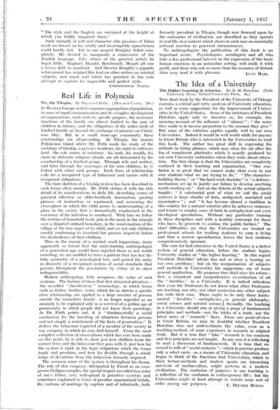The Idea of. a University
The Higher Learning in America. By R. M. Hutchins. (Yale University Press: Oxford University Press. 9s.) Timis short book by the President of the University of Chicago contains a critical and witty analysis of University education, as well as some SuggeStions for the -improvement of Univer- sities in the United States. Some of the strictures of President
Hutchins apply only to America—as, for example, the amusing account of the influence of " alumni "—" the noise they make is in inverse proportion to time amount they give."
But some of the criticism applies equally well to our own Universities. Indeed it would be well worth while for anyone
in Great Britain who is interested in the Universities to read this book. The author has great skill in expressing his attitude in biting phrases, which may clear the air after the fog of complacent platitudes which is usually produced by our own University authorities when they write About educa- tion. Time first charge is that the Universities are completely confused in their teaching and organisation. "Our con- fusion is so great that we cannot make clear even to our own students what we are trying to do." " The charieter- building theory," or "the hard-work doctrine" is "a defence- mechanism set up to justify our failure to 'develop anything worth working on." And on the defectS of the actual subjects taught : " A substantial part of what we call the sdcial sciences is large chunks of data, undigested,- unrelated and meaningless " ; and " it has become almost a tradition in this country for a natural scientist after he achievea eminence and leisure to employ some of both in inetaphySical and even theological speculations. Without Any partidular -training in these disciplines and with a healthy contempt"fiir those who have, he proceeds to confuse the public further." The chief difficulties are that the Universities arc treated • as professional schools for training students to earn ft living and that a narrow specialisation leaves the best • students
comprehensively ignorant. • -
The cure for lad education in the United States is a- better system of general education, before the student begins University studies or " the higher learning," In this regard President Hutchins' advice has not so close a bearing on our own problems ; but on the- reorganisation of subjects and methods in Universities his suggestions are of more general application. He proposes two chief aims for reform : first, a consistent and comprehensive co-ordination of all the " faculties " in a University. It is indeed ridiculous that even the Professors do not know what other Professors arc teaching, nor why, nor what connexion any other subject has with their own. There ought to be only three funda- mental " faculties "—metaphysics or general philoSophy, social science and natural science.* Secondly, the teaehing in a University should aim at giving a grasp of fundamental principles and methods—not the tricks of a trade, nor the latest news of " research " facts. From our point-of-view in Great Britain, we may be doubtful whether President Hutchins does not underestimate the value, even as a teaching-method, of some experience in research or original work. But it is true that " fake " research is too common and that principles are not taught. In any case it is refreshing to read a discussion of fundamentals. It is time that we ceased to talk of " social contacts "—which in practice-produce only a select caste—as a means of University education, and began to think of the functions that Universities, which in their lecture-methods - and student sports are interesting survivals of mediaevalism, might perform in a modern civilisation. The confusion of purposes in our teaching is a reflection of the confusion in contemporary life ; but the Universities might at least attempt to restore some sort of
order among our purposes. • " •-•
C. DELISLE Bunss.






































 Previous page
Previous page